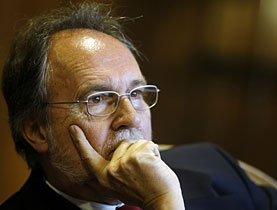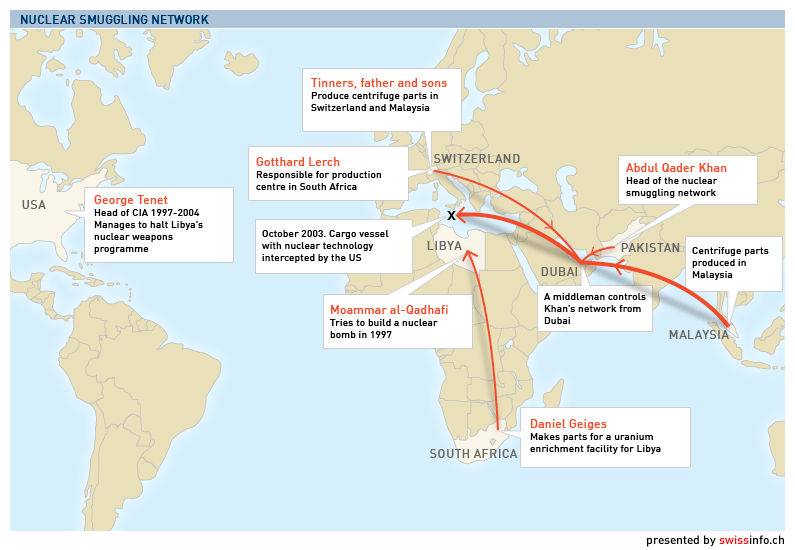Cabinet comes under fire over nuclear documents

Swiss senator Dick Marty has strongly criticised the government's decision to shred documents linked to an international nuclear smuggling case.
The centre-right Radical politician, best known for his Council of Europe report on secret CIA rendition flights, and head of the Swiss Senate foreign affairs committee, told swissinfo that the cabinet probably bowed to pressure from the United States.
The Swiss government has been under attack since it was revealed last month that it had decided to destroy the documents in the interests of national security. Among the papers seized from a family of Swiss engineers were the plans for a nuclear bomb.
On Monday, Justice Minister Eveline Widmer-Schlumpf defended the decision, saying it was in accord with international guidelines.
The defence ministry denied last week that the CIA put pressure on the government to destroy the papers. There have been allegations in the Swiss press that the three engineers had in fact been working for the US foreign intelligence service.
However Marty reckons the government should have not intervened in a judicial matter and at least consulted the Federal Court before acting.
swissinfo: Defence Minister Samuel Schmid and former Justice Minister Christoph Blocher have said the decision was in the national interest, as have some outside experts. Doesn’t this detract from the possibility of an American intervention?
Dick Marty: It’s easy to say you are acting in the nation’s best interests when nobody can check. The Federal Court, which is as good as the government or the Federal Prosecutor’s Office at keeping secrets, should have at least been involved.
It would have guaranteed that an independent body agreed that the destruction of the documents was truly in Switzerland’s interest. During the investigation, private parties handled the papers. It seems unlikely to me that there was only one version of the documents out there.
swissinfo: Swiss President Pascal Couchepin declared that Switzerland had respected its obligations under the nuclear Non-Proliferation Treaty in destroying the papers. Is this credible?
D.M.: As far as I know, the International Atomic Energy Agency [which oversees the treaty] never asked for the destruction of the documents. We could have respected the treaty by avoiding their publication and putting them under lock and key.
That would have been preferable since criminal proceedings are still underway and the papers were part of the case being built up. Destroying them means they are gone forever. This could lead to the collapse of the legal case.
swissinfo: Has the separation of the judicial and executive powers been violated?
D.M.: It seems obvious to me. The government can intervene when vital national interests are involved, but these interests could have been safeguarded efficiently and in a correct manner by involving the Federal Court in the decision to destroy the documents.
swissinfo: Green parliamentarian Geri Müller said the destruction of the documents hid something else, secret accords with the United States incompatible with Swiss neutrality. Do you agree?
D.M.: I don’t know. It seems realistic though to think that the US administration put pressure on Switzerland. That is the only credible version for me. Otherwise I don’t understand why there was such a rush to destroy those documents. Nobody even thought of involving the Federal Court. That shows how strong the pressure was.
If there are secret accords with the US, the secret has been well kept. All I have been able to see is that in the framework of fighting terrorism, the Americans signed secret agreements with many European states under the auspices of Nato.
Accords were also signed with countries that were not members of Nato, but part of the Partnership for Peace [of which Switzerland is a member]. The authorities say Switzerland signed nothing, but nobody really knows.
swissinfo: You have attacked former Justice Minister Blocher, in office at the time, saying he failed to respect Swiss institutions, even though the shredding was a joint cabinet decision.
D.M.: I’m not handing out a scorecard. It was a cabinet decision, but the request came from the justice minister, who had travelled to Washington a short time earlier.
swissinfo: A parliamentary report is expected this autumn. What are you expecting?
D.M.: It’s too early say. I can only note that Mr Couchepin said that the appropriate parliamentary delegations had been informed before the documents were destroyed, but their members have gone on the record that were only told afterwards. I find that very worrying.
swissinfo-interview: Carole Wälti
In 2004 the International Atomic Energy Agency supplied the Swiss authorities with a list of two companies and 15 individuals suspected of dealing in nuclear material with Iran and Libya.
Swiss engineer Urs Tinner, who is suspected of helping Libya obtain nuclear weapons technology, was arrested in Germany in October 2004. He was extradited to Switzerland in 2005.
His father Friedrich and brother Marco were also arrested by the Swiss authorities on suspicion of breaking the law on war materials by illegally exporting nuclear bomb-making equipment to Libya.


In compliance with the JTI standards
More: SWI swissinfo.ch certified by the Journalism Trust Initiative











You can find an overview of ongoing debates with our journalists here . Please join us!
If you want to start a conversation about a topic raised in this article or want to report factual errors, email us at english@swissinfo.ch.